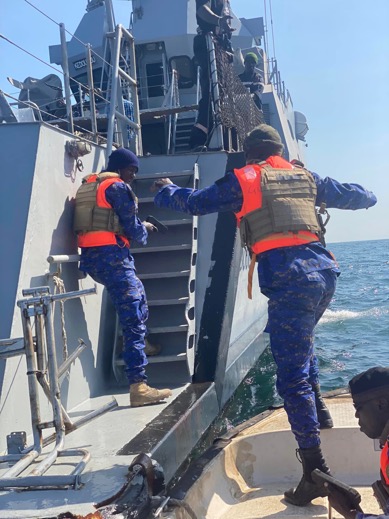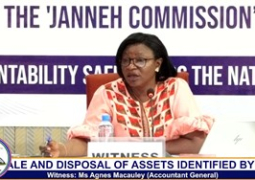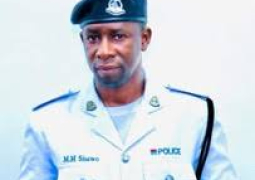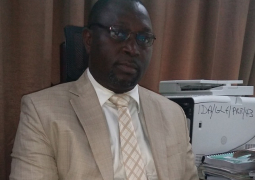
On 20 August, the GAF issued a press release confirming the immediate dismissal of seven personnel for acts deemed “Conduct Prejudicial to Good Order and Discipline,” in accordance with Section 78 (1) of the Gambia Armed Forces Act (GAFA) 1985, Cap 19:01 Vol IV Revised Laws of The Gambia. However, the statement stopped short of detailing the specific reasons behind the dismissals, some of which involved long-serving officers.
The dismissed soldiers include: Lieutenant (N)Abba Nyassi, Fleet Chief Petty Officer (FCPO) Musa Dampha, Warrant Officer Class 2 (WO2) Ismaila Jobe, Chief Petty Officer (CPO) Musa Jammeh, Chief Petty Officer (CPO) Alagie Secka, Chief Petty Officer (CPO) Ebou Marong, and Leading Seaman (LS) Lamin DK Sanneh.
In the wake of the announcement, The Point launched an independent investigation, which has unearthed troubling evidence suggesting that the dismissed soldiers, particularly those serving in the navy, had allegedly collaborated with criminal gangs operating within Gambian territory. The navy, tasked with safeguarding the country’s waters, is now under scrutiny for what appears to be a breach of duty and trust.
Sources close to the investigation revealed that the soldiers received illicit payments and gifts in exchange for facilitating or overlooking criminal activities. Among the alleged benefits were cash handouts and livestock, including Tobaski rams, symbolic and valuable assets during the Muslim feast of Eid al-Adha.
Our investigation revealed that criminal gangs were allegedly transferring payments into the bank accounts of the seven dismissed soldiers, in exchange for allowing them to use Gambian waters to carry out clandestine activities.
An anonymous source has provided crucial information to our investigative reporter, shedding light on the intricate operations of criminal gangs colluding with navy personnel. The report reveals that navy officers in May 2025 intercepted a high-powered speedboat equipped with 300 horsepower, which was believed to be engaged in illicit activities.
This interception highlights the alarming level of cooperation between members of the armed forces and organised crime. Furthermore, the investigation has uncovered the involvement of an officer from the Gambia Revenue Authority (GRA), who is suspected of collaborating with these criminal networks.
According to our source, these transactions have been confirmed by local banks. The officers also confessed to accepting Tobaski gifts, specifically rams, from individuals linked to the criminal network.
The revelations emerged following a series of joint investigations between The Gambia Navy and the Drug Law Enforcement Agency (DLEAG), beginning in May 2025.
Our source added: “During a routine patrol, naval personnel intercepted two suspicious boats off the coast. One vessel was successfully apprehended, containing 200 drums of fuel, while the other managed to escape. The individuals found aboard were not Gambian nationals and claimed they were transporting the fuel to Mbour, Senegal. However, the unusually large quantity raised suspicions.”
“Further scrutiny revealed that the intercepted canoe was equipped with a 300-horsepower engine, far more powerful than the standard 100-horsepower typically used in local fishing vessels. This discovery prompted a deeper investigation by both the Navy and DLEAG.”
The Point newspaper was able to establish that in June 2025, another boat was found anchored off the shores of Kartong. “No individuals were present, and initial drug tests yielded no results. Later that month, a second vessel was discovered in the same area. Local residents reported the abandoned boat, but the alleged owner failed to retrieve it despite being contacted. The Navy subsequently impounded the vessel.”
“Investigators traced the ownership of one of the boats to an individual employed by the Gambia Revenue Authority (GRA). Under questioning, the suspect admitted the vessel might belong to a group but refused to disclose further names. He claimed that several security personnel were involved in the network, prompting investigators to pursue additional leads,” our source postulated.
“Eventually, names were provided, and all of whom were serving members of the Navy. These individuals were detained and subjected to further interrogation. They admitted that cocaine had already been offloaded somewhere along the Gambian coastline, possibly near Batokunku or Tanji, although the exact location remains unclear.”
The Point newspaper also unearthed the unusual details involving the gifting of Tobaski rams. A local livestock seller confirmed that a man had purchased several rams and instructed him to distribute them to anyone who claimed to be sent by him. This gesture, investigators believe, was part of a broader effort to curry favour with security personnel.
“I haven’t worked directly with the DLEAG, but I’ve been informed about the ongoing management and restructuring within the agency. Based on what I’ve heard, I believe the country is on track to becoming free from drug-related activities," our source said.
”The leadership is not only reforming the agency but also strategically repositioning its personnel into key areas aimed at tackling and addressing drug-related issues. This is precisely the kind of leadership we need in our collective effort to make The Gambia drug-free, and without doubt, we are heading in the right direction.”
In conclusion, our source revealed that drug traffickers are increasingly exploiting the country’s porous borders and coastal waters, particularly as narcotics operatives have significantly tightened security at the airport, making clandestine activities there more difficult.
While this information could not be independently verified, the source disclosed that the narcotics agency intends to collaborate more closely with the Navy to patrol the nation’s waters. The aim is to ensure that traffickers are denied any safe haven within the country.
The leadership of the Drug Law Enforcement Agency (DLEAG), who were also contacted for comment on the matter, declined to respond.
Meanwhile, Captain Kemo Kanuteh, the acting spokesperson for the GAF, could not be reached at the time of going to press.





